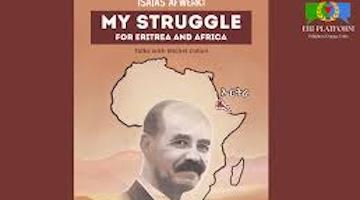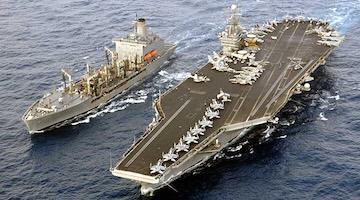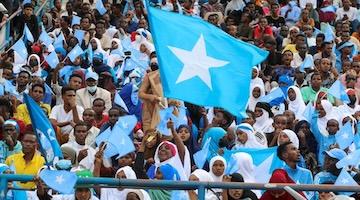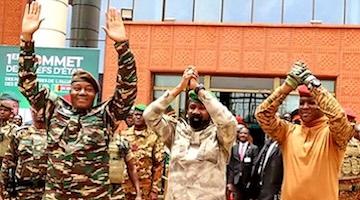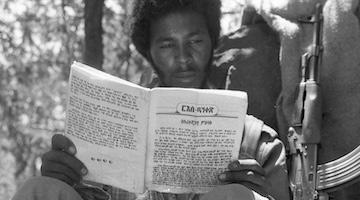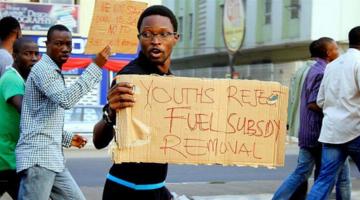Ethiopian president Abiy Ahmed and Eritrean president Isaias Afwerki in 2018 (Photo: G.M.A. Visafric)
BAR Contributing Editor Ann Garrison spoke with Amanuel Biedemariam, author of The History of the USA in Eritrea, about regional integration in the Horn of Africa and the Nile Basin among Ethiopia, Eritrea, and Somalia.
ANN GARRISON: In the peace agreement of 2018 Eritrea, Ethiopia, and Somalia pledged, “The three countries shall build close political, economic, social, cultural and security ties.” Why don't you start by telling us about the promise of that agreement between Ethiopia, Eritrea and Somalia?
AMANUEL BIEDEMARIAM: Well, I think it is natural for Eritrea, Ethiopia, Somalia to come together. They are in the same region. They have the same security interests. They have the same geopolitical interests. They are also part of the Arabian Nubian Shield, which is a major resource rich area. That is a vast area that incorporates Saudi Arabia, Yemen, Jordan to a certain point, Egypt, Sudan, Ethiopia, Eritrea, and Somalia. And Eritrea is on the Red Sea.
They are also among the Nile Basin countries. And so it is strategically important that they work together. They must work together in order for them to collectively take advantage of all the resources and strategic location that they have.
AG: Two of the three countries who signed the agreement, Ethiopia and Somalia, have since been badly wounded. Could you talk about that?
AB: Well, the United States and Washington do not want the independent alliance between Eritrea, Somalia and Ethiopia.
Washington is also keen on making sure that Ethiopia remains either in a weakened state, or fragmented to the point where they can control it by, for one, encouraging conflict.
Before the Biden administration, the Trump administration wanted to work with Eritrea and Ethiopia. And that is when the agreement between Somalia, Eritrea and Ethiopia happened.
And the Trump administration was keen to work with these countries collectively and even bring Russia into the fold to sideline China. That was his administration’s approach.
However, when the Biden administration came, they wanted to do what they did during the Obama and Bush years, which is to maintain control over Somalia, maintain control over Ethiopia using the TPLF, and then making sure that Eritrea remains sidelined.
So as soon as the Biden administration came back to office in 2000, even before they came to office, they were targeting Ethiopian Prime Minister Abiy Ahmed. They wanted to make sure that he was on notice that he could not do anything to grow. They also wanted to make sure that he didn't do anything to the military and to Tigray because they wanted to use them to weaken Eritrea and to control Ethiopia. So, in an effort to do that, they pressed Ethiopia; they started the war with the TPLF and Ethiopia. They also managed to remove Somalia’s President Farmaajo and replace him with President Hassah Sheikh Mohamud.
So the US worked very hard to divide the three countries so they could control them, but the idea of a united approach—regional integration—has already cycled into the communities in these countries, and it’s not going away. In addition to that, with China and Russia in the equation, it becomes far more difficult for the West to continue its divide-and-conquer policies.
Moreover, if they don't have a presence in Ethiopia, especially in the Tigray Region, they believe that their presence in that area is going to be completely wiped out. As a result, they want to make sure that there's some kind of US presence, using the Tigray Region, using whatever’s left of the TPLF. They could use the TPLF to get in the way of the overall regional integration that incorporates a whole range of countries—Egypt, Sudan, Eritrea, South Sudan, Uganda, Central African Republic, Chad, Mali, Libya, Ethiopia, and to a certain extent Somalia and Kenya. So that is what they want, to prevent that integration. The impediment has been Washington.
AG: What would regional integration look like specifically?
AB: The regional integration is already in place. It is just not formalized. The people of Eritrea have special connections with the eastern part of Sudan. The people of Eritrea have been integrated regionally, in terms of business with the Ethiopian side in the northwestern part of Ethiopia. Both countries border Sudan. Through that, a lot of goods from Ethiopia, from Gondar, and all these different central and higher regions, including the Tigray Region, used to come through the Tekezē River. These countries all share borders.
It’s like a dry port area that has been working for a long time. It's only been hampered by conflict. Without conflict, there would be goods transported and traded all through there. And also you have the Port of Assab in Eritrea on the Red Sea, where goods and services go back and forth from Ethiopia.
Ethiopia uses Eritrean corridors through both the Ports of Massawa and Assab. The ports of Massawa serve the eastern part of Sudan and the northwestern part of Ethiopia. And that is one of the richest areas in Ethiopia. It’s a very fertile area with vast resources for Sudan, Eritrea, and Ethiopia. So the cooperation is there. It just needs to be formalized, and it needs to start working better.
AG: So this means that all the countries involved would be better able to industrialize and create a more complex division of labor in regions where most people are still subsistence farmers. It would allow all these countries to build industries, to use their own strengths to specialize, and to trade with one another. Is that the idea?
AB: Absolutely, you know, but I think that is where it is heading right now. Because what China and Russia are trying to do is to stabilize the energy situation in the region, and to industrialize the area. That’s happening within that region that I just mentioned earlier, especially Eritrea, Ethiopia, Sudan, South Sudan, Egypt, Chad, Libya, and Uganda. This is a population of over 500 million people, the majority of them young. It is resource rich and it’s one of the most strategic places on earth.
They're going to be able to build this pocket that will become an alternative to Western markets. You build up the middle class in that region and that means you have a new market in a very, very rich area where they can help develop and create partnerships with one another. That's the direction that the West is not going along with. And that's what they're fighting very hard to stop.
AG: Eritrea has particularly rich mineral resources, but it is demanding a better deal than most African countries get. Most African countries get something like four or five percent, if that, and often they don’t even get what’s promised. Tell us about how Eritrea is demanding a better deal.
AB: Well, Eritrea has a lot of leverage in that it controls the security forces of the country. It offers peace and stability, trust, lack of a cumbersome bureaucracy, and efficiency to investors.
Eritrea’s access to the Red Sea also gives it leverage. And also the fact that Eritrea has a vast array of resources.
What Eritrea has been able to do is develop slowly, incrementally. Work in one area, develop this area like the Bisha Gold Mine, which met tremendous hindrances from the West, sanctions and all kinds of other impediments, but yet the government of Eritrea was able to make an agreement oriented towards the environment and the public good.
One thing Eritrea demands is that Eritreans are educated in resource extraction.
AG: They’re going to learn mining technology?
AB: Exactly. And there's also the tax component of it. We want to make sure that these people working in Eritrea are taxed just like everybody else. They're going to pay local taxes in addition to those in the mining contracts. And the agreements are fair to where everyone, Eritrea and the investors, both benefit.
Now we have the potash mine that's going to yield income for Eritrea for a long time. Eritrea has leveraged all its advantages to make really good deals with countries like China. We make sure we will find out what the detail of the deals looks like in the end. I think Eritrea is leveraging everything that it has extremely well. And it's going to make sure that it’s partnering with countries that want to do good and have a long term relationship with the country. That’s what makes Eritrea different from the other African countries.
AG: How do you think of the current ethnic strife, which is threatening to become a full blown war or perhaps an extended low intensity conflict in the Amhara region of Ethiopia? How do you think that is going is affect these plans for regional integration?
AG: The people of Ethiopia are going to need Eritrea whether Ethiopia is together or apart. The Amhara Region cannot survive without access to the sea through Eritrea. The Tigray region could not sustain itself without connection to Eritrea.
So it’s not going to stop the regional integration, but it could hamper it seriously, because either a full scale war or an extended low intensity conflict could mean a weakened central government. And is that going to happen? Is that likely to happen? I think there is a lot of noise outside abroad in the diaspora, and there's some deliberate attempt to weaken the nexus between Eritrea, the Amhara, and Ethiopian Prime Minister Abiy Ahmed. They want to make sure that they don't see that kind of unity in the region, but it will emerge eventually.
Ann Garrison is a Black Agenda Report Contributing Editor based in the San Francisco Bay Area. In 2014, she received the Victoire Ingabire Umuhoza Democracy and Peace Prize for her reporting on conflict in the African Great Lakes region. She can be reached at ann(at)anngarrison.com. Please help to support her work on Patreon.





